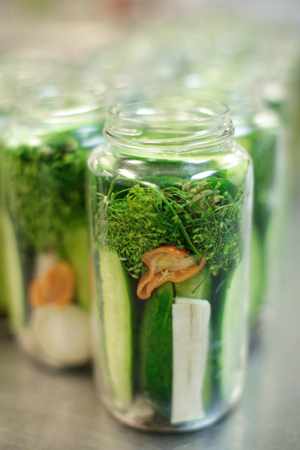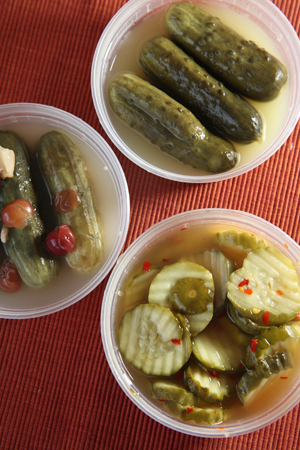 |
Hand-packed with fresh dill and a habanero chile: spicy dills. Photo courtesy The Real Dill. |
| WHAT IT IS: Artisan pickles from all over America. |
| WHY IT’S DIFFERENT: These are small-batch, hand-packed: No factory assembly line. |
WHY WE LOVE IT: Artisans are always trying to do the big guys one better. |
| WHERE TO BUY IT: See individual listings. |
|

Paul’s Gourmet Foods makes the largest variety of pickles, many with gourmet flavors; and was one of our three overall winners. Photo by Elvira Kalviste | THE NIBBLE. |
|
The Best Pickles
From American Artisans
Is a pickle a vegetable, we were asked one day. Actually, no. The industry classifies it as a condiment.
In fact, the word condiment comes from the Latin condimentum, a noun derived from the verb condire, to pickle or preserve. Over time, the usage expanded to food substances used to heighten the natural flavor of foods: a fish sauce, hot sauce, relish, spice or vinegar, and later, ketchup, mayonnaise.
As we began our exploration of pickles, we realized we needed to confine this chapter to pickled cucumbers. In the rest of the world, a pickles can be any type of pickled vegetable (cabbage, carrots, green beans, and much of the rest of the garden).
Commercially-available pickles have not received much love from the American public until fairly recently. There have always been those lucky enough to find a great pickle at a local farmers market or a good deli. But for most of us, pickles have been a commodity condiment: like ketchup, it’s something we didn’t spend a lot of time pondering.
While most Americans are familiar with the big national brands, like Claussen, Heinz and Vlasic, relatively few can name other brands.
A Return To Small Batch Pickle Making
That situation is starting to change, though. Within the past decade, a crop of small-scale pickle manufacturers has come onto the scene, and some have done very well for themselves.
Where the big national and regional brands sometimes use synthesized preservatives, cheap sweeteners, flavorings, and/or food coloring in their pickles, the greater percentage of smaller manufacturers eschew such ingredients, preferring instead to use real herbs and spices, sugar or honey or maple syrup if the pickles are sweetened, and no preservatives or food colorings.
Some of the small-scale pickle makers have products certified as non-GMO; others employ, or try to employ, seasonal and local/regional ingredients.
Why do these foodpreneurs make pickles? “For purely selfish reasons” said one, who began pickling his own because he couldn’t find any commercial pickles he really liked.
The Scoop On Pickles
We’ve assembled everything you need to know about pickles.
Our three favorite overall lines are Paul’s Gourmet Foods, Red Hop Mama and Rick’s Picks. But we’ve got plenty of favorites and runners up.
So head to Best Pickles and almost 50 brands tasted in our Pickle Reviews.
— Stephanie Zonis
|





